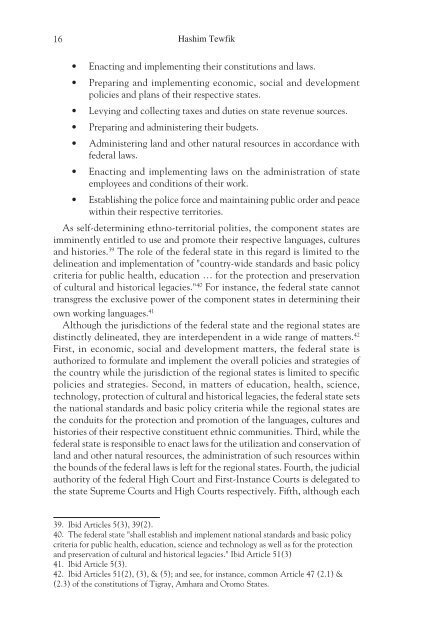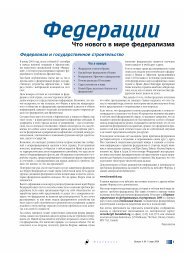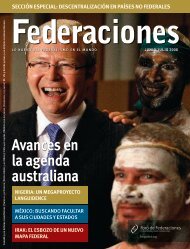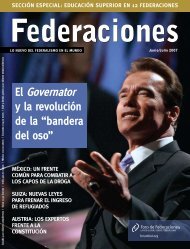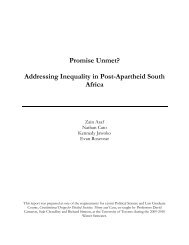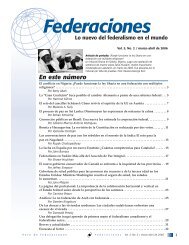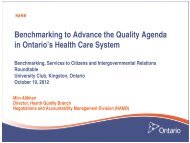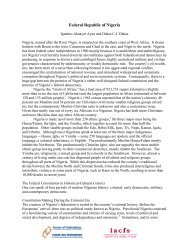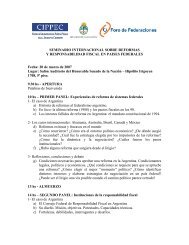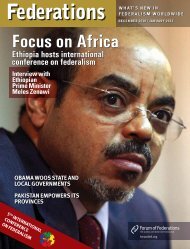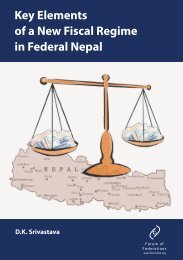Transition to Federalism: The Ethiopian Experience - Forum of ...
Transition to Federalism: The Ethiopian Experience - Forum of ...
Transition to Federalism: The Ethiopian Experience - Forum of ...
You also want an ePaper? Increase the reach of your titles
YUMPU automatically turns print PDFs into web optimized ePapers that Google loves.
16 Hashim Tewfik<br />
• enacting and implementing their constitutions and laws.<br />
• preparing and implementing economic, social and development<br />
policies and plans <strong>of</strong> their respective states.<br />
• levying and collecting taxes and duties on state revenue sources.<br />
• preparing and administering their budgets.<br />
• administering land and other natural resources in accordance with<br />
federal laws.<br />
• enacting and implementing laws on the administration <strong>of</strong> state<br />
employees and conditions <strong>of</strong> their work.<br />
• establishing the police force and maintaining public order and peace<br />
within their respective terri<strong>to</strong>ries.<br />
as self-determining ethno-terri<strong>to</strong>rial polities, the component states are<br />
imminently entitled <strong>to</strong> use and promote their respective languages, cultures<br />
and his<strong>to</strong>ries. 39 <strong>The</strong> role <strong>of</strong> the federal state in this regard is limited <strong>to</strong> the<br />
delineation and implementation <strong>of</strong> "country-wide standards and basic policy<br />
criteria for public health, education … for the protection and preservation<br />
<strong>of</strong> cultural and his<strong>to</strong>rical legacies." 40 For instance, the federal state cannot<br />
transgress the exclusive power <strong>of</strong> the component states in determining their<br />
own working languages. 41<br />
although the jurisdictions <strong>of</strong> the federal state and the regional states are<br />
distinctly delineated, they are interdependent in a wide range <strong>of</strong> matters. 42<br />
First, in economic, social and development matters, the federal state is<br />
authorized <strong>to</strong> formulate and implement the overall policies and strategies <strong>of</strong><br />
the country while the jurisdiction <strong>of</strong> the regional states is limited <strong>to</strong> specific<br />
policies and strategies. second, in matters <strong>of</strong> education, health, science,<br />
technology, protection <strong>of</strong> cultural and his<strong>to</strong>rical legacies, the federal state sets<br />
the national standards and basic policy criteria while the regional states are<br />
the conduits for the protection and promotion <strong>of</strong> the languages, cultures and<br />
his<strong>to</strong>ries <strong>of</strong> their respective constituent ethnic communities. Third, while the<br />
federal state is responsible <strong>to</strong> enact laws for the utilization and conservation <strong>of</strong><br />
land and other natural resources, the administration <strong>of</strong> such resources within<br />
the bounds <strong>of</strong> the federal laws is left for the regional states. Fourth, the judicial<br />
authority <strong>of</strong> the federal high court and First-instance courts is delegated <strong>to</strong><br />
the state supreme courts and high courts respectively. Fifth, although each<br />
39. ibid articles 5(3), 39(2).<br />
40. <strong>The</strong> federal state "shall establish and implement national standards and basic policy<br />
criteria for public health, education, science and technology as well as for the protection<br />
and preservation <strong>of</strong> cultural and his<strong>to</strong>rical legacies." ibid article 51(3)<br />
41. ibid article 5(3).<br />
42. ibid articles 51(2), (3), & (5); and see, for instance, common article 47 (2.1) &<br />
(2.3) <strong>of</strong> the constitutions <strong>of</strong> Tigray, amhara and oromo states.


